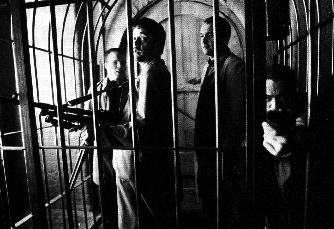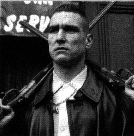Cockney capers
Four friends, Tom (Jason Flemyng), Soap (Dexter Fletcher), Eddy (Nick Moran) and Bacon (Jason Stratham) have a foolproof plan to make some money - they manage to scrape one hundred thousand pounds between them so that they can enter a high stakes card game, run by a local gangster "Hatchet Harry" (P.H. Moriarty). Well, not exactly foolproof, since the end result is that, courtesy of Eddie's card-playing skills, they end up owing Harry half a million pounds. Harry kindly offers them a week to pay up - if they don't, he'll send his associate, "Barry the Baptist" (Lenny McLean) to lop a finger off each of the four for every day that the debt is overdue. They have another alternative - Eddy's father (Sting) can hand over his bar to Harry.
| Naturally, the guys plan to acquire the money by less than legal means. This initially poses a problem for Soap, because while the others are crooks (of the very small town variety) , Soap is a chef. He overcomes his qualms since he realises that he can't do much cooking without fingers. Their new plan is even riskier than the card game - they live next door to a bunch of serious criminals, who specialise in violent robberies and drugs. When the guys overhear them planning a robbery (through a conveniently thin wall), they decide to rob the criminals when they return. A risky but potentially lucrative plan. |  |
Guy Ritchie's directorial debut is a brash, funny and self-confident heist movie. It's been compared to The Long Good Friday (another East End gangster movie) and Reservoir Dogs, but in truth, it reminds one most of the 'classic' English comedies of the Fifties, albeit with naughtier words. The plot is a complete labyrinth - in addition to the debt (and it's collection), there is a pile of drug money and drugs, and a pair of antique muskets (the two smoking barrels of the title) which pass their way through the hands of most of the characters at some point in the movie.
The Tarantino influence is evident throughout the film - the criminals are portrayed in the same darkly humorous way as in Pulp Fiction, complete with funny, offbeat 'back-stories which establish the credentials (and nicknames) of the different criminals (i.e. Barry the Baptist gets his name from his technique of half-drowning people to get information. Charming). Lenny McLean's character (the ferocious Barry) is a blatant copy of Laurence Tierney's character in Reservoir Dogs ( they even look slightly alike), but his performance is all his own. His huge bulk, his Cockney accent and his snarling, shaven headed visage are enough to put the fear of God in anyone, and it is ultimately the threat of his retribution that motivates most of the other characters in the film. McLean died soon after he completed his role last year and the film is dedicated to him.
| The other 'enforcer' is Big Chris (Vinny Jones). Vinny Jones is well known in the U.K. as a former footballer (of the tough, uncompromising variety - he played for Wimbledon F.C. when he and his fellow team mates were known as the Crazy Gang), and he is well suited to the character of Big Chris. While I can't see him beating Robert De Niro for too many roles, he acquits himself well, and he certainly appears more comfortable in his role than Eric Cantona's laughable cameo in Elizabeth. |  No more Mr. Nice Guy. |
Naturally, the second plan of the four friends doesn't fare much better than the first, with the result that all the interested parties converge for a literally explosive climax. If there is one flaw in the film, it is that there are two many characters. In addition to the four heroes, there is the criminal gang living next door, a bunch of upper-class dope heads (who own the aforementioned drugs and money), and two incompetent Scousers who are entrusted with the task of stealing the muskets. There is also Rory Breaker (Vas Blackwood), whose fearsome reputation is described in a hilarious flashback, Nick the Greek (Stephen Marcus), the guys' hapless middleman, and of course, Hatchet Harry himself. While Ritchie sets up the different stories in a slick manner, he is not so successful in their resolution. The end of the movie outstays its welcome, dragged out by the need to resolve the fate of each character. Sharp editing is a Tarantino trait that Ritchie would do well to copy.
There are a few other plot holes. The thin wall, through which the guys can overhear everything next door, is a very convenient plot device. Also, it seems amazing that none of the gangsters realise that the muskets are old weapons (and probably not that dangerous). And where does one get ammunition for 17th century weapons ? Despite that, this film is still a lot of fun. The dialogue is sharp, funny and often profane, and the violence is conducted off-screen for the most part. The cast have fun with their roles (all revelling in nastiness) even if Sting's performance is the least convincing Cockney geezer since Dick Van Dyke (in Mary Poppins). The best Tarantino comparison to make is that Lock... is an immensely entertaining movie, and a great debut. Think The Ladykillers (1955) , updated for the Nineties with plenty of attitude.
Directed by Guy Ritchie.
| ****** Excellent - An outstanding
movie ***** V. Good - Very enjoyable or engrossing **** Good - Entertaining *** Mediocre - Nothing special ** Poor - A waste of time * Terrible - Complete rubbish |
**** |
| .Back to the top | . |
. |
© 1999 Stockholm Film Review. All Rights Reserved.